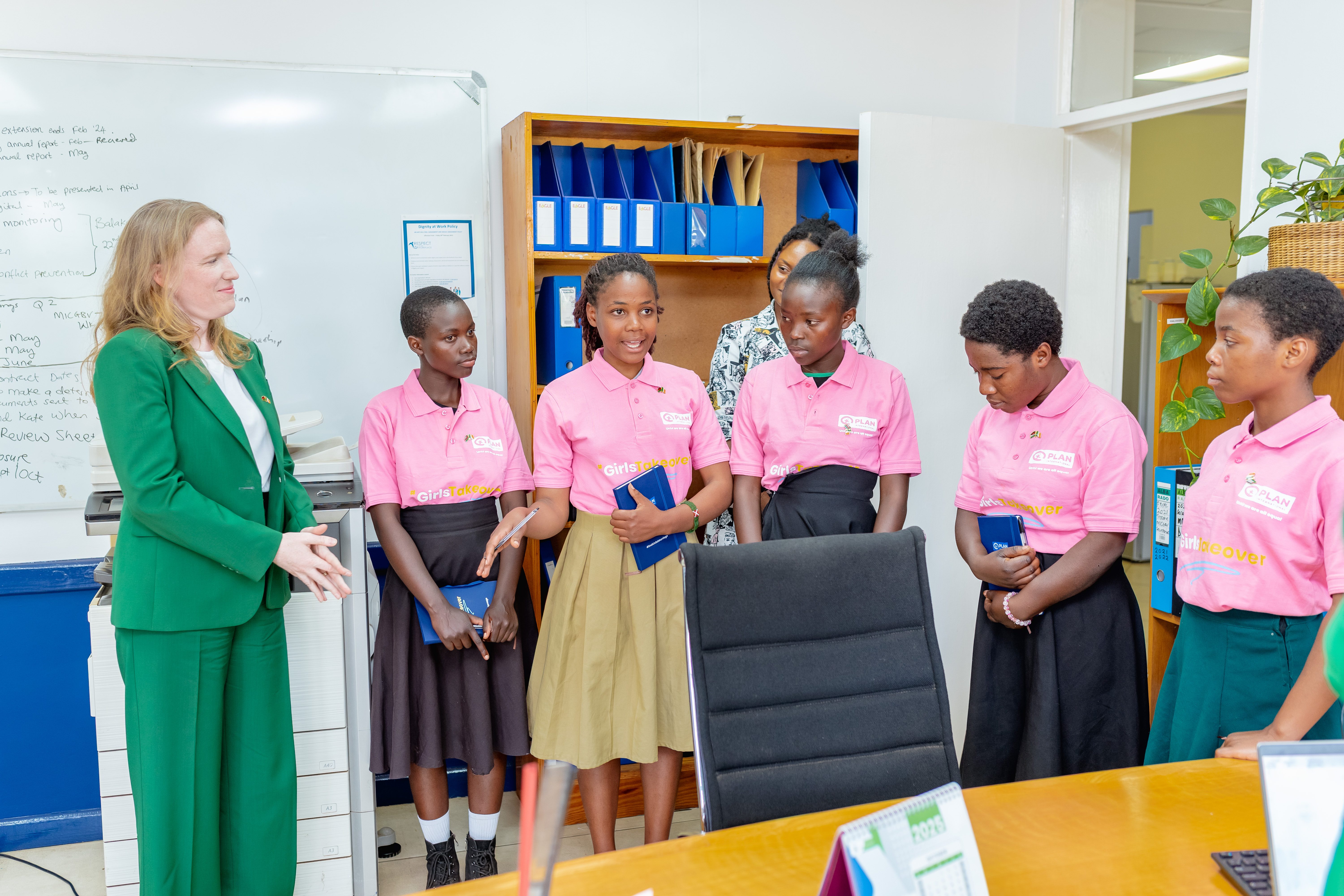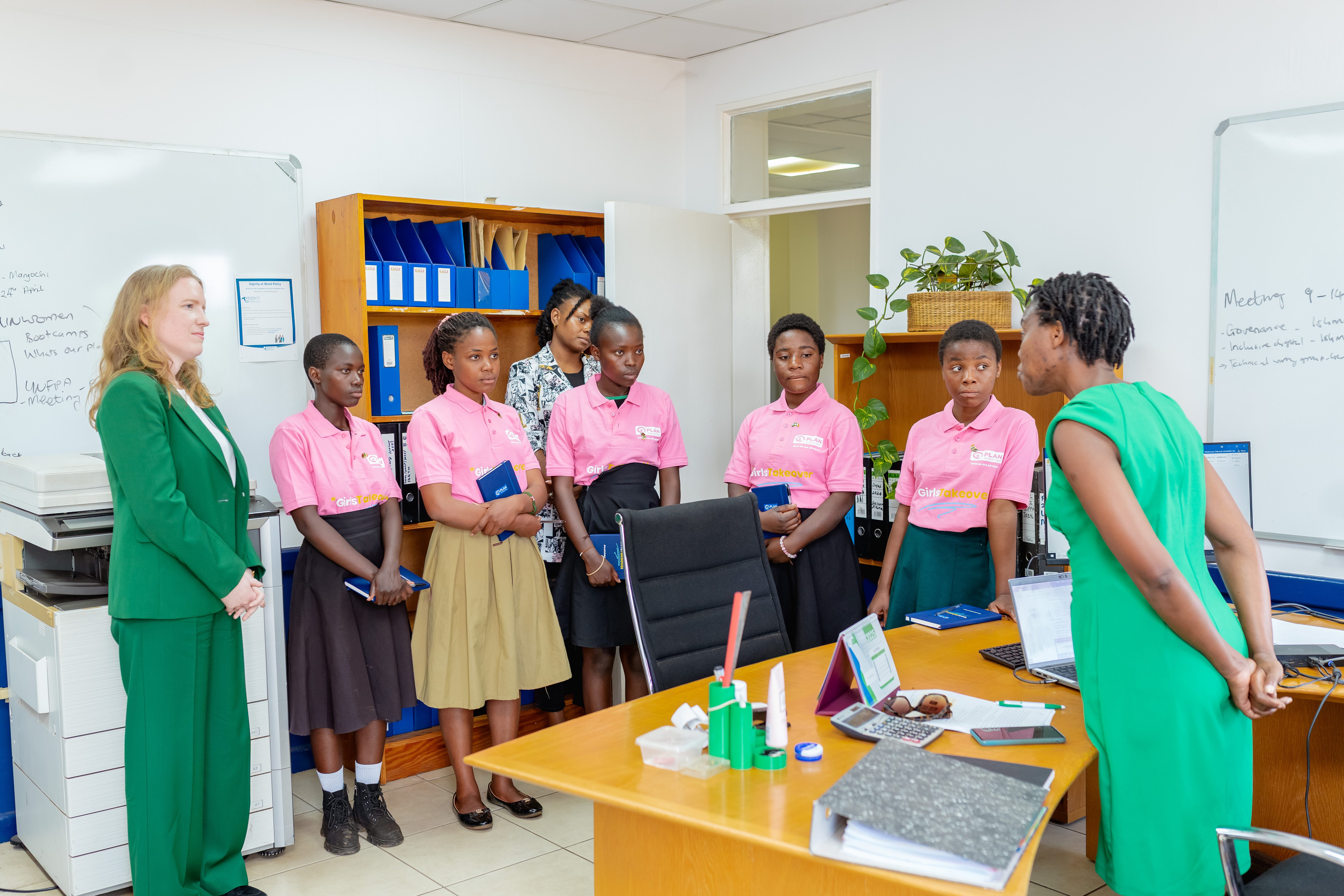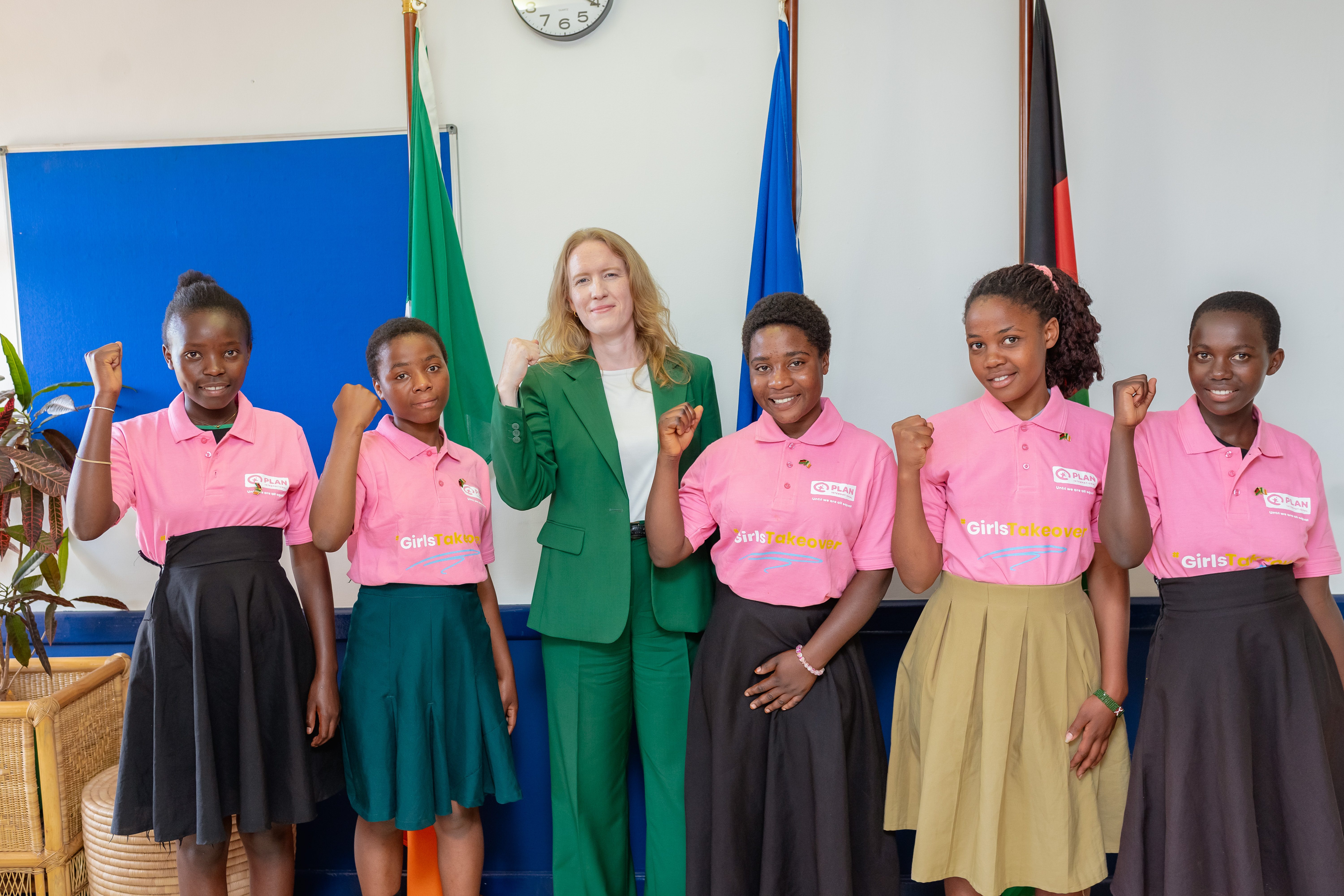As part of this year’s International Day of the Girl celebrations, held under the global theme “The Girl I Am, The Change I Lead”, Malawian girls stepped boldly into positions of power across the country, from the UN Women office to major corporate spaces and embassies, proving that girls’ voices belong at every decision-making table.
Through Plan International Malawi, girls swapped roles with senior officials, chaired meetings, and shared their visions for a more equal world. Guided by Plan International’s brand proposition, “Until We Are All Equal,” and aligned with this year’s campaign pillar, End Child Marriage, the takeovers went beyond symbolism, they became a powerful catalyst for change.
Championing equality at UN Women Malawi
At the UN Women country office in Lilongwe, Joyce, Lora, Esme, Linley, Esme M and Trintas, confidently took over several seats. Joyce took over the seat of the UN Women Representative Ms Letty Chiwara. Sitting behind the desk of the Country Rep, she thanked staff for the warm welcome and jumped into discussions about girls’ health and education.
Joyce chaired the morning briefing, calling on colleagues to strengthen health education and clinics for young women. “I’ve seen too many girls in my village drop out of school because they lack sanitary pads or get pregnant. If I were in charge, I would make sure every girl learns about her health rights and can access health services and counselling when she needs it.” Joyce said.
The UN Women Country Representative praised Joyce’s leadership; “She came in with fresh ideas on reproductive health and gender equality. Together with other girls, we have been challenged and we have made several commitments to them to challenge norms and end child marriage,” she said.





“If I were in charge, I would make sure every girl learns about her health rights and can access health services and counselling when she needs it.”
Joyce, 17
Diplomatic dreams at the British High Commission
At the British High Commissioner’s Office, 3 girls swapped places with diplomats. Barbra, Lonely and Lisa arrived at the High Commissioner’s Office ready to make their mark. Barbra took over from Ms Rebecca Fabrizi, the British High Commissioner to Malawi and outlined a plan to improve girls’ right to education and health care.
In a briefing with embassy staff, the girls laid out priorities. They focused on girls’ education, protection and justice. “As the new High Commissioner, I would work to enforce laws so that no girl is forced into marriage.” Barbra said.
The High Commissioner was amazed with how the girls were so confident in reminding the staff how they’re supposed to work. “Being here made me realise how powerful young people’s ideas are. The girls challenged us and reminded us that we can collaborate with other organisations in ending child marriage,” she said.
After the takeover, the British High Commissioner hosted a lunch for the takeover girls to meet Justice Fiona Mwale, an influential judge. During the luncheon, the girls were inspired with messages about their strength, potential, and the importance of staying in school.
“Use the exposure you have now to make a difference, not just for yourself, but for your community. Encourage other girls to work hard and stay in school,” said the Justice Fiona Mwale.





“Use the exposure you have now to make a difference, not just for yourself, but for your community. Encourage other girls to work hard and stay in school.”
Justice Fiona Mwale, Judge in the High Court of Malawi
Banking on girls’ futures at Standard Bank Malawi
Different female executives welcomed 4 bright young guests – Naomie, Alice, Maness and Maggie into their offices in Lilongwe. The girls listened intently as the bank’s executives described how a major bank works. During the takeover the girls took over the roles of the bank’s Head of Legal and Governance and the Company Secretary, Head of Compliance, Suite Leader, Private Banking and Head of Credit.
Explaining what they would do with leadership power, the themes were familiar: education funding, health support and ending child marriage. “We would start a scholarship fund for girls so they never have to drop out,” Naomie told the staff. Alice, aspiring to be a lawyer, declared: “I would make sure there are banks or mobile money options for mothers so they can earn and save, financial independence will help protect girls from exploitation.”
The bank’s executives, Norah Nsanja, Head of Legal and Governance and the Company Secretary, Chikondi Kapyepye – Head of Compliance, Dora Mangulama – Suite Leader, Private Banking and Jessie Bisika – Head of Credit, later praised the girls’ vision.
“They reminded us of the urgent need to invest in women’s education and economic power,” Nsanja said.






“I would make sure there are banks or mobile money options for mothers so they can earn and save, financial independence will help protect girls from exploitation.”
Alice, 11
Bridging the digital divide at Telekom Networks Malawi
Joy, Fortunate and Rose took the helm at Telekom Networks Malawi (TNM) headquarters. Taking over as CEO, Joy focused on health innovation, proposing an app that allows nurses to offer girls confidential advice on health and hygiene. The three girls engaged with company executives, sharing their perspectives on empowering young women.
“I’d start an app where nurses give girls confidential advice about health and hygiene,” she said.
Later, the takeover girls joined a roundtable with TNM’s senior managers, where they advocated for greater investment in girls’ education through technology. Building on the discussion, Joy recommended providing free data to help students study effectively from home.
The TNM staff were impressed, noting that the girls’ priorities matched the company’s values of connectivity and inclusion.
“These young women showed us that technology must also bridge gender gaps; their passion for science and care reminded us that ICT can empower girls even in crisis.” Michael Hebert-TNM CEO.






“These young women showed us that technology must also bridge gender gaps. Their passion for science and care reminded us that ICT can empower girls even in crisis”
Michael Hebert-TNM CEO.
Global vision, local action at the Irish Embassy
Odetta, Dearlene, Rosenie, Franklyn and Anna were welcomed into the Irish Embassy by Ambassador Kate Brady and her team. After learning about Ireland’s aid programmes, Odetta, took over the role of the Irish Ambassador to Malawi. She said as the Irish Ambassador she will complement the Malawi government’s efforts to strengthen child protection laws.
In the embassy meeting, the girls framed their vision around education and equality. They emphasised ending child marriage and violence. Ambassador Brady praised their insights and told them that, “Ireland is committed to championing gender equality and opportunities for women and girls.”






A call to action
Each takeover story proves that when Malawian girls are given power and voice, they lead with purpose, tackling education, healthcare, justice, and economic empowerment. Their determination to end child marriage, which still affects about 38% of girls, is clear.
Development partners must listen and act on their ideas, from funding rural schools to improving girl-friendly healthcare. Real progress depends on investing in girls’ priorities and leadership.
Plan International and its partners call on all stakeholders, governments, businesses, donors, and communities, to uphold girls’ rights to education, health, and leadership.
“Being here made me realize how powerful young people’s ideas are. The girls challenged us and reminded us that we can collaborate with other organizations in ending child marriage”
Ms Rebecca Fabrizi, the British High Commissioner to Malawi.
Watch the girls’ takeovers through https://www.youtube.com/@planinternationalmalawi631



